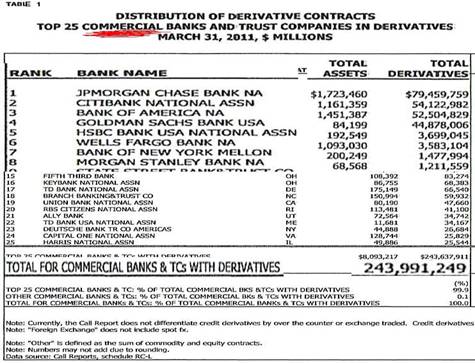Can you do the math and figure the harm to the world if the international banking cartel can entwine into India's finances? China? Can you say ONE WORLD CURRENCY?

Banks must not be allowed to trade in commodity derivatives
Source: HinduBusinessLine

Banks must not be allowed to trade in commodity derivatives
“A banker can only be a banker. If he tries to be something else, we will face the same crisis as the US and Europe are facing” - - former India Finance Minister, Mr P. Chidambaram
Mumbai, Jan. 16:
The most worrying aspect of the hard push to let banks enter the commodity derivatives space is not the claim of hedging their so-called risks, but finding an opportunity of investing surplus cash.
The commodity futures market regulator, Forward Markets Commission (FMC) is once again reported to be lobbying the Finance Ministry for allowing commercial banks to enter commodity derivatives market for the ostensible reason that the banks have exposure to commodities and need to hedge the price risks.
Import of gold and crop loans to farmers are cited as examples of banks' commodity-based transactions and exposure. Currently, banks are not allowed to trade commodities.
The proposal which is now sought to be given a renewed push is not new at all.
Way back in 2005-06, the Gupta Committee report recommended that banks, mutual funds and foreign institutional investors be allowed to enter commodity derivatives market.
Business Line was the perhaps the only newspaper to caution the policymakers against any such hasty move which will have potentially damaging effect on the real economy that is the physical market for commodities. Mercifully, the recommendation was put on hold.
Little has changed in the last five years. If anything, inflation is still raging, demand-supply mismatch in case of several commodities is widening and there is hardly any evidence of banks having gained any product knowledge or market knowledge about commodities, and much less about commodity price risk management.
The most worrying aspect of the hard push to let banks enter the commodity derivatives space is not the claim of hedging their so-called risks, but finding an opportunity of investing surplus cash.
Commodity derivatives market is hardly the place for banks or, for that matter, cash-rich insurance companies to park their funds. It will simply mean allowing too much money to chase commodities especially by those with inadequate market knowledge.
distortive consequences
In case of commodities in short supply, flow of bank funds will lead to potentially avoidable distortive consequences on market prices.
Importantly, banks seldom have exposure to commodities per se. Banks fund commodity traders and give crop loans to farmers. This way, the banks' exposure is to the borrower, not to the commodity for which it lends.
It would, therefore, make eminent business sense for commercial banks to insist that borrowers follow requisite price risk management principles including hedging in futures exchanges. Crop loans to farmers can be safeguarded by taking recourse to crop insurance or other appropriate insurance products.
Indian commercial banks have been lending to various businesses including brick and mortar projects for decades; it is therefore reasonable to assume they have gained some knowledge about lending for such projects by following prudential norms.
Yet, the amount of non-performing assets (NPAs) among banks has been rising to worrisome levels. Commodity markets are a lot riskier and less reliable than solid brick and mortar projects. Banks must stick to their core competency. Their primary duty is to lend money prudently and after due diligence.
It is likely that the commodity futures market regulator may be overstepping his brief by attempting to promote business interests of commercial banks and commodity futures exchanges. This is best avoided. A regulator's duty is to regulate the market. Period.
In this context, one cannot help recall former Finance Minister, Mr P. Chidambaram's statement in October 2008 after global meltdown hit the banking sector.
He said at that time, “A banker can only be a banker. If he tries to be something else, we will face the same crisis as the US and Europe are facing”.
We hope policymakers in New Delhi and elsewhere take note of this and not seek to push through so-called liberal reforms that run the risk of becoming counter-productive.